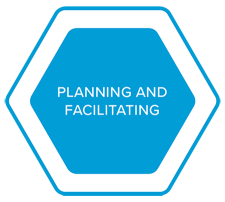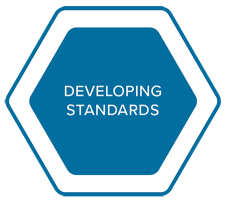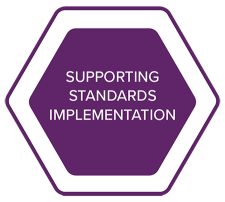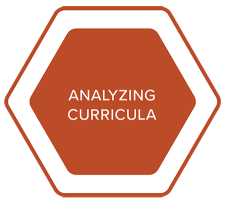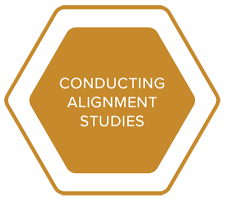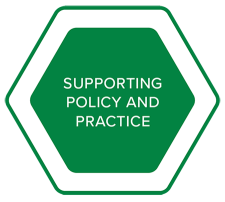Standards and Assessments Ecosystem
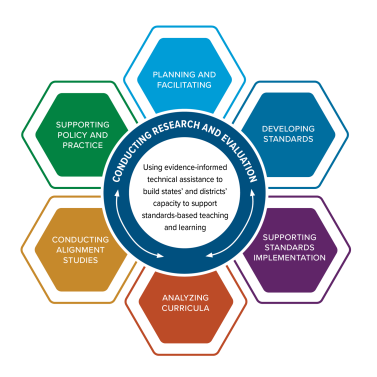
AIR recognizes the vital role of high-quality standards in developing assessment, evaluation, and accountability systems. A standards-based education system ensures all students are prepared for college, careers, and military service. High-quality standards and assessments are the foundation of a strong education system and inform cohesive policy decisions that support equitable teaching and learning outcomes for all students.
Using evidence-informed technical assistance, AIR works with states and districts to support standards-based teaching and learning. AIR’s experts also conduct rigorous research and evaluation methods to study standards-based systems. Informed by decades of technical assistance and research, AIR developed the Standards and Assessments (S&A) Ecosystem. The AIR S&A Ecosystem provides a cohesive and comprehensive structure to guide the development of standards-based systems.
Interact with the icons below to explore the elements of our Standards & Assessments Ecosystem:
Planning and Facilitating
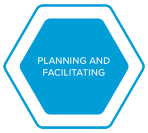
AIR supports state education agencies (SEAs), regional education agencies (REAs), and local education agencies (LEAs) as they collaborate with diverse constituents to plan and facilitate standards and assessment development. AIR utilizes evidence-informed protocols and tools to support engagement with diverse voices and groups in the development or revision of academic standards and assessments.
- Conducting landscaping scans
- Conceptualizing evidence-based engagement strategies
- Analyzing constituent feedback to make data-informed decisions
Developing Standards
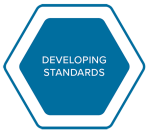
AIR has extensive expertise and experience supporting states, particularly SEAs, in the development and revision of standards. AIR guides SEA through this complex process from start to finish. We apply evidence-informed processes and support the creation of guidance and communications that SEA leaders can use to ensure that new standards are high quality and that the process involves and effectively communicates to key constituents.
- Applying research-informed practices to facilitate standards development
- Convening constituents and experts to revised standards
- Using tools and resources during the standards development process
- Using evidence to ensure standards are high quality
Supporting Standards Implementation
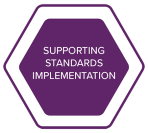
Implementing new state standards requires the support of multiple education leaders—the SEA, REAs, school and district administrators, teachers, and others, all of whom hold important and varying roles in the education system. AIR uses evidence-informed processes and resources to create guidance to support standards implementation.
- Working with constituents to design and monitor implementation plans
- Facilitating the development of resources that support implementation
- Identifying high-quality instructional materials to support implementation
- Aligning standards-based systems to assessment and accountability systems and policies
Analyzing Curricula

AIR works collaboratively with states and districts to conduct highly audits of curricula. AIR’s individual school curriculum audits are designed to provide information to school and district leadership teams about the curriculum and the instruction taking place in their buildings so that the teams can identify specific areas on which to focus improvement efforts.
- Conducting curriculum audits to confirm evidence base
- Evaluating curriculum for standards alignment
- Performing equity audits of curriculum
- Evaluating high-quality instructional materials including curriculum and digital learning platforms to align with standards
- Aligning and monitoring of curriculum implementation
Conducting Alignment Studies
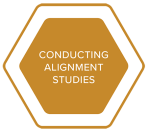
AIR has a long history of developing and applying methodologies to analyze the content of standards and assessments. Our 30+ studies in this area over the past two decades have been undertaken for both comparative and evaluative purposes and have examined how various standards or assessments may be similar or different from one another, how standards or assessments may or may not change over time, and if standards and assessments that are intended to be aligned with each other are, indeed, aligned. Our capabilities also include analysis of assessment items, using cognitive labs with students, to validate their measurement of standards and support ESSA reporting requirements.
- Comparing the content of standards and assessments across programs
- Examining grade progression within and across standards and assessments
- Assessing alignment of standards and assessments over time and within programs
- Validating assessments with a focus on ESSA reporting requirements
Supporting Policy and Practice
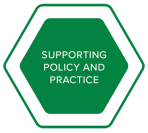
AIR works with federal, state, and local clients to support their efforts to use standards and assessment policies and practices to improve teaching and learning.
- Using co-interpretation of assessment data or curriculum audits to analyze and develop action plans
- Analyzing and reporting assessment results
- Developing tools for teachers to better access and use assessment results
- Conducting research and policy analyses
